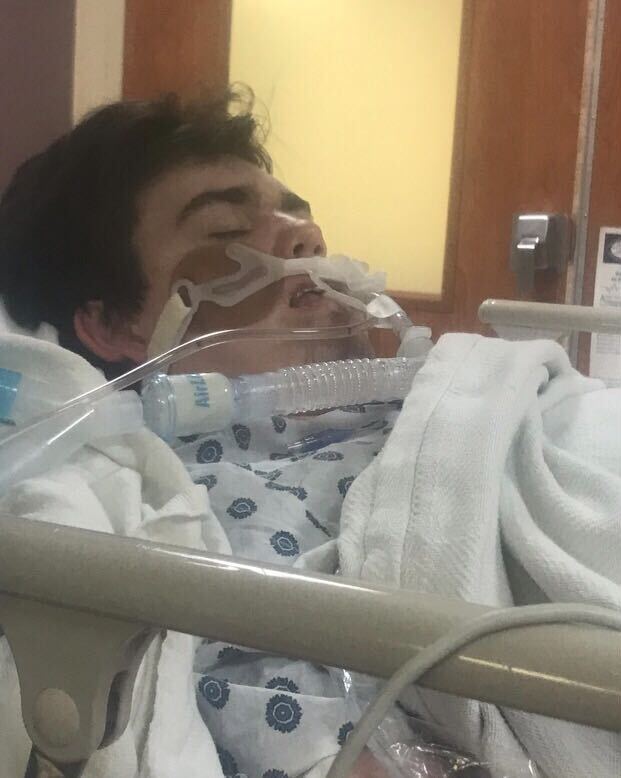Mississippi News
How Mississippi’s mental health system failed this family in crisis
‘Shut down every step of the way’: How Mississippi’s mental health system failed this family in crisis
Lacey and Teddy Hutchinson of Mize watched, tears streaming down their faces, as their son was intubated and flown by helicopter to Merit Health River Region Hospital in Vicksburg because he needed mental health services the state of Mississippi could not provide.
On Feb. 7, their 22-year-old nonverbal autistic son Colby had a violent outburst with his babysitter, so extreme she had to hide under a table to protect herself from harm.
Lacey and Teddy quickly left their jobs and rushed home. They called 911, and two sheriff’s deputies who had received crisis intervention training were dispatched there.
Though Lacey said the deputies were compassionate and helpful, Colby could not be calmed down. So officers handcuffed him, and he was transported to Magee General Hospital, where he was given a high amount of antipsychotic medications that left him unconscious, Lacey said.
Colby’s physician assistant at Magee quickly started making calls to find a hospital with a psychiatric unit that would take him, Lacey said. He reached out to Forrest General Hospital, University of Mississippi Medical Center, St. Dominic’s, and Boswell Regional Center, among others. All had the same message: no beds are available.
“He tried so hard to find a place for Colby, but we were shut down every step of the way,” Lacey said.
Jane Walton, Communications Director at Disability Rights Mississippi, a nonprofit organization that advocates for Mississippians with disabilities, said that the Mississippi Department of Mental Health (DMH) needs to increase the number of inpatient beds at state hospitals so that those in crisis, like Colby, aren’t left without care.
She also said an emphasis needs to be placed on making sure the county one lives in doesn’t dictate a person’s access to community-based care.
“They (the Hutchinsons) got the worst of the worst at every turn. But I think this highlights how at really every turn there are barriers for people with disabilities and their families to receiving the care that they need in Mississippi,” Walton said.

As the pandemic overwhelmed hospitals, it also impacted another area of healthcare: mental health services in facilities operated by the state.
In January, DMH had more than 1,000 fewer employees than it did a year earlier.
Out of options and unable to safely take Colby home, Lacey and Teddy decided to accept a doctor’s recommendation to intubate Colby and send him by air ambulance to Merit Health River Region Hospital in Vicksburg. Lacey felt her state and nation had failed her and her family.
“I was overwhelmed by that feeling of hopelessness,” Lacey said. “Knowing that I couldn’t be there with him, I was terrified, and don’t want anybody else to have to go through that.”
If the system was working as it should, Colby would have been admitted to a nearby psychiatric ward or state hospital with specific services for patients with disabilities, but that didn’t happen.
Colby spent two days intubated in the emergency room. After being taken off the ventilation, he was given medications to temper his aggression and restrained to his bed when those efforts failed. While the staff was giving Colby the best care they could, Lacey said, being so heavily medicated that he was rendered unconscious isn’t what he needed.
During that time, Lacey and Teddy, both of whom work, had taken vacation days so they could be with Colby. One night, they even slept in their car to avoid a costly hotel stay. Exhausted and heartbroken, they reached out to their representatives in the state legislature and Wendy Bailey, executive director of the Mississippi Department of Mental Health.
Bailey helped secure Colby a bed at East Mississippi State Hospital in Meridian so his medications could be properly adjusted, Lacey said. After a week there and with his behavior under control, Colby was admitted to Boswell Regional Center.
“We are so thankful Colby is now getting the help he needs, but it shouldn’t have taken such extreme measures to get him these services,” Lacey said. “The state really needs to have plans in place to better handle situations like this.”
The mental health crisis Colby experienced didn’t appear out of thin air. It had been building to that point for months.
Colby had previously been a resident of Boswell Regional Center, one of five regional facilities in the state that treats people with intellectual and developmental disabilities. But in October 2020, he had to leave due to a bowel obstruction that put him in Forrest General Hospital in Hattiesburg for 28 days. That stay involved three separate intestinal surgeries and caused Colby to drop from 126 to 79 pounds. He also had seizures regularly, some lasting as long as 45 minutes, due to being unable to take his seizure medications by mouth, his mother said.
When the Hutchinsons were able to bring Colby home, he had a colostomy bag and was too weak to be readmitted to Boswell. Thankfully, they were able to get Colby adequate at-home care through the Mississippi Medicaid Home & Community Based waiver program.

At-home care was working for the Hutchinsons until October of last year when Colby began exhibiting serious behavioral issues. They reached out to Boswell in late December with the hope of readmitting Colby but were told that would not be possible due to COVID-related staffing issues.
By January, Colby’s condition had deteriorated significantly. He was only sleeping for four hours each night, and his parents were bruised daily during his violent outbursts. Adding extra hours to Colby’s behavioral support care, medication adjustments and new behavioral management strategies all failed to address the issue.
This downward spiral continued and only grew more severe until the breaking point on Feb. 7.
After struggling for so long to get Colby the care he needs, Lacey is frustrated with the inadequacies of the state’s mental health system and feels like COVID-19 is used as an “excuse” to deny care.
“I think somebody could have stepped up and said ‘Okay, this family is in need. We need to do something for him,’” Lacey said.
But Bailey said in order to maintain the quality of care, DMH had to adjust.
“Some of our programs have had to reduce bed capacity so that they can operate in a safe manner,” Bailey told Mississippi Today.
Virus outbreaks at facilities that require quarantine periods and staff calling out sick has also caused bed capacity to decrease.
Bailey said that DMH’s ultimate goal is to get staffing and program capacity levels back to pre-pandemic levels and then focus heavily on expanding access to community-based care.
Last year, U.S. District Court Judge Carlton Reeves ruled in favor of the U.S. Department of Justice, which had sued the state of Mississippi on allegations it violated The Americans With Disabilities Act by not prioritizing treating mental health patients in community settings when possible instead of placing them in hospitals.
The budgetary increases DMH needs to implement new community-based care initiatives will likely come from Mississippi’s share of American Rescue Plan Act funds. Senate Bill 2865 would provide over $104 million to DMH to address issues exacerbated by the pandemic.
It has passed in the Senate, but would need to be approved in the House to reach Gov. Tate Reeves’ desk.
The proposal focuses on initiatives to improve the state’s crisis system for people like Colby. Among the initiatives in the proposal is the addition of 60 beds in crisis stabilization units, which exist to treat people experiencing a psychiatric crisis without an inpatient admission to a state hospital. Another initiative would create crisis diversion homes that will allow patients like Colby to be diverted from institutional settings, but still receive 24/7 care.
Bailey said that often people who experience a mental health crisis and are institutionalized have exhausted their current living situations and have no other alternative.
“That’s not going to always work,” Bailey said. “There’s always going to be situations that require a higher level of care, but if we can serve somebody in the community and prevent that (institutionalization), that’s what we want to do.”
Joy Hogge, Executive Director of Families as Allies, said that the problem with adding services is that it attempts to solve a problem without improving systems already in place.
“It (the ARPA proposal) seems very focused on adding services,” Hogge said. “And I know we need services, but the infrastructure needs to be created so that those services are coordinated across the system.”
This article first appeared on Mississippi Today and is republished here under a Creative Commons license.
Mississippi News
Attorneys file motion to delay Jackson bribery trial
SUMMARY: In connection with the Jackson bribery scandal, attorneys for federal officials and local leaders filed a motion to postpone the trial to allow time for extensive evidence review, including hours of recordings and thousands of pages of documents. Key figures charged include Hinds County DA Jody Owens, Jackson Mayor Chokwe A. Lumumba, and Councilman Aaron Banks, each facing multiple counts of conspiracy related to bribery and fraud. The scandal involves alleged bribes amounting to over $80,000 related to a downtown development project, facilitated by individuals posing as real estate developers working with the FBI.
The post Attorneys file motion to delay Jackson bribery trial appeared first on www.wjtv.com
Mississippi News
Family of Dexter Wade rallies outside JPD nearly two years after his death
SUMMARY: Nearly two years after Dexter Wade’s death, his family continues seeking justice. On November 20, Dexter Wade Day was observed in Jackson, declared by Councilman Kenneth Stokes. Wade, hit by a Jackson police cruiser in March 2023, was later found in a pauper’s grave in Hinds County, and his mother, Bettersten Wade, was unaware of his death until August 2023. She believes his death was covered up. No arrests have been made, and authorities consider it an accident. Jackson Police Chief Joseph Wade expressed condolences and shared updates on new policies to prevent similar tragedies.
The post Family of Dexter Wade rallies outside JPD nearly two years after his death appeared first on www.wjtv.com
Mississippi News
Man shot while helping with stalled vehicle in Jackson
SUMMARY: A man was shot in Jackson, Mississippi, while attempting to assist a person with a stalled vehicle on State Street at Beasley Road around 4:00 p.m. on November 20. Detective Tommie Brown reported that the victim was working on the vehicle when the suspect approached, questioned him, and then opened fire. The assailant fled the scene in a vehicle. Fortunately, the victim sustained non-life-threatening injuries and was taken to a local hospital. The Jackson Police Department is seeking information about the incident and encourages anyone with details to contact them or Crime Stoppers.
The post Man shot while helping with stalled vehicle in Jackson appeared first on www.wjtv.com
-

 Our Mississippi Home7 days ago
Our Mississippi Home7 days agoCreate Art from Molten Metal: Southern Miss Sculpture to Host Annual Interactive Iron Pour
-

 Local News6 days ago
Local News6 days agoCelebrate the holidays in Ocean Springs with free, festive activities for the family
-

 News from the South - Georgia News Feed6 days ago
News from the South - Georgia News Feed6 days ago'Hunting for females' | First day of trial in Laken Riley murder reveals evidence not seen yet
-

 News from the South - Alabama News Feed7 days ago
News from the South - Alabama News Feed7 days agoFirst woman installed as commanding officer of NAS Pensacola
-

 Kaiser Health News4 days ago
Kaiser Health News4 days agoA Closely Watched Trial Over Idaho’s Near-Total Abortion Ban Continues Tuesday
-

 Mississippi Today6 days ago
Mississippi Today6 days agoOn this day in 1972
-

 News from the South - Alabama News Feed3 days ago
News from the South - Alabama News Feed3 days agoTrial underway for Sheila Agee, the mother accused in deadly Home Depot shooting
-

 News from the South - Alabama News Feed2 days ago
News from the South - Alabama News Feed2 days agoAlabama's weather forecast is getting colder, and a widespread frost and freeze is likely by the …

































